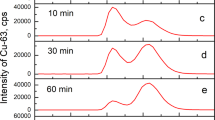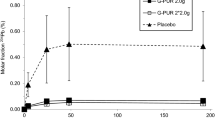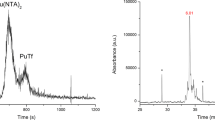Abstract
PLUTONIUM in the blood plasma of man and rat is believed to be associated readily as a chelate with the (β-globulin transferrin1,2, but studies with citrate ions have shown that when the plasma citrate concentration exceeds 10 mg per 100 ml., plutonium citrate is formed in preference to the plutonium–transferrin complex2. Artificial loading of blood with tri-sodium citrate to above 10 mg/100 ml. is possible in the intact animal with little toxic reaction, as has been shown for man3. We report the results of an experiment designed to evaluate the use of citrate in the treatment of acute plutonium poisoning with a view to extrapolating the data to humans.
This is a preview of subscription content, access via your institution
Access options
Subscribe to this journal
Receive 51 print issues and online access
$199.00 per year
only $3.90 per issue
Buy this article
- Purchase on Springer Link
- Instant access to full article PDF
Prices may be subject to local taxes which are calculated during checkout
Similar content being viewed by others
References
Stover, B. J., Atherton, D. R., and Kellar, N., Radiat. Res., 10, 130 (1959).
Boocock, C., and Popplewell, D. S., AWRE Report No. 0–37/66 (1966).
Ludbrook, J., and Wynn, V., Brit. Med. J., ii, 523 (1958).
Author information
Authors and Affiliations
Rights and permissions
About this article
Cite this article
SMITH, H., CHAPMAN, I. Use of Citrate in mobilizing Plutonium in Rat. Nature 223, 642–643 (1969). https://doi.org/10.1038/223642a0
Received:
Revised:
Issue Date:
DOI: https://doi.org/10.1038/223642a0
Comments
By submitting a comment you agree to abide by our Terms and Community Guidelines. If you find something abusive or that does not comply with our terms or guidelines please flag it as inappropriate.



